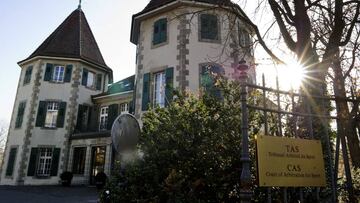Sport’s legal system shaken by ruling in Seraing case
A Brussels Court of Appeal has ruled that the obligatory arbitration of the Court of Arbitration for Sport is illegal in the case concerning third party ownership of players.

A Brussels Court of Appeal has handed down a historic sentence which could shake to the core the legal system of the sporting world. The 25 page long ruling, dated 28 August, holds that the “enforced arbitration” of the Court of Arbitration for Sport (CAS) is illegal, thus authorising appeals in sporting matters to be heard in domestic courts. The Brussels court considers that the arbitration rules set out in the statutes of Fifa, Uefa and their members, which oblige legal disputes to be heard exclusively by the CAS, violate article 6 of the European Convention of Human Rights and article 47 of the European Charter of Fundamental Rights.
The ruling, by extension, affects all national and international sporting organisations (FIBA, EHF…) and opens up the possibility for any club or athlete to take legal action against, for example Fifa or Uefa, in the domestic courts of their country. They will be able to reject the jurisdiction of the CAS, which will only apply where there is real consent between the parties.
The legal ruling comes as part of the legal battle started in 2015 by Belgian club RFC Seraing and investment fund Doyen Sports in light of the prohibition by Fifa of the use of investment funds for the ownership of players. Represented by Jean-Louis Dupont, known for his work on the Bosman case, and Martin Hissel, the claimants sought not only to have Fifa’s decision overruled, but extended their arguments to major issues such as the legality of Uefa’s Financial Fair Play rules, the ability of the sporting organisations to levy punishments and above all, the very legitimacy of the CAS. The other issues will be looked at in a future hearing, scheduled for 4 October.
According to sources close to the case, the main goal of Seraing and the club’s lawyers was always to seek a sentence revoking the “enforced arbitration” of the CAS, above all the other matters. In their case they argued that there is room for doubt over the impartiality and independence of the CAS given that the body is under the economic and political influence of sport's international federations. Furthermore, as it is based in Switzerland, the court does not have to apply European Union law. This led the Brussels Court of Appeal, back in January, to look again at the case, requesting more information regarding the CAS and examining the legality of the obligation of football clubs to take their cases exclusive to the CAS.
It appears that Fifa and Uefa were unaware of the danger brewing in Brussels and are now facing a problem that could affect the way they, and other sporting bodies, work. The ruling could also affect old cases. “It’s highly probable that many rulings handed down by the CAS could now be questioned, on the basis of the illegality of the arbitration clauses”, said the claimants.
Related stories
The Brussels Court of Appeal denied Uefa’s petition to have the process thrown out, and also refused Fifa’s demand to have the case heard in Zurich, on the grounds that it is based in Switzerland. The Brussels court has not, as yet, accepted the request by the claimants to have a series of questions taken to the Court of Justice of the European Union to obtain a ruling on the case within the framework of the UE’s fundamental freedoms (free movement of capital, services and individuals) and European competition law. The Brussels court, rather, found that it had jurisdiction to continue to hear the case, which raises further questions over the pretensions of the federations to control the economic aspects of their sport and to maintain an independent judicial system for sport.
The Robert Heras case, an important legal precedent
In their arguments before the Brussels Court of Appeal, the claimants relied on a ruling by the Supreme Court of Spain in the Roberto Heras case. The Spanish court annulled the cyclist's positive drugs test in the 2005 Vuelta de España, concluding that Heras did not have to take his appeal against his punishment to the CAS, and that athletes' consent to this tribunal was not 'free and voluntary'. That ruling held that obligatory arbitration is unconstitutional in Spain.
